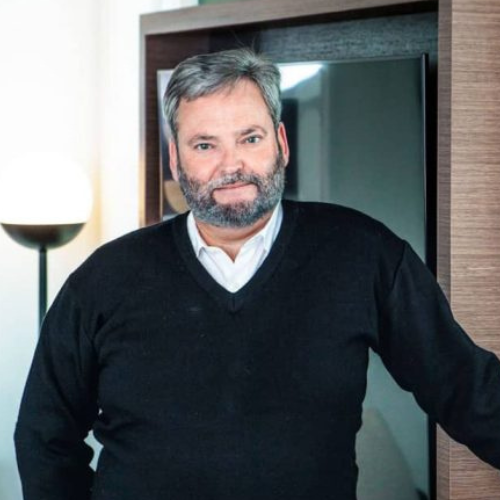Episode 346 – November 3, 2022
Listen On: Apple Podcasts | Spotify | Google Podcasts | YouTube
President & CEO of Fifth Avenue Real Estate Marketing Scott Brown joins Adam & Matt to discuss the current state of the real estate market in Vancouver and beyond. Which markets are getting hit the hardest in this inflationary environment? How is the presale business & what does this mean for options in 2023 & beyond? And where should you buy today? Tune in but don’t drop out!
Listen to Episode
Guest Information

Scott Brown
As CEO of Fifth Avenue Real Estate Marketing Ltd. (“Fifth Avenue”), W. Scott Brown directly oversees the growth and success of the executive leadership teams responsible for delivering sustained sales success and Developer Partner client satisfaction. Throughout his 30+ years of experience, Scott has formed and led teams that have set sales records throughout North America and Asia, which most recently includes the acquisition of Peerage Realty Partner’s, BakerWest Real Estate Inc., Epic Real Estate Solutions Inc., and Island Realm Real Estate Ltd., where he serves as Executive Director.
Episode Summary
Who is Scott Brown? What is Fifth Avenue Real Estate Marketing?
I’m the President & CEO of Fifth Avenue Real Estate Marketing. We believe that BC is very regionalized and so have companies around the province to represent different markets.
I founded our downtown and Richmond firm, Baker West, who is marketing the world’s tallest passive house, Curv. I’m also the CEO of our Okanagan based company, Epic. And I’m on the board of our Island based company, Island Realm Real Estate. So that helps me to cover the province pretty well.
Is BC more regionalized than Ontario?
Absolutely. Our sister company in Ontario, Baker, does business in Ontario and Quebec all under one brand. But here in BC, none of our firms has been able to be that strong across the entire province. So we decided to set up local firms and partner with people who are on the ground everyday and know the market.
We have local leadership but a consistent process and system across our brands. That was an intentional strategy for us.
How is the Lower Mainland real estate market right now?
Because 2021 was such an outlier, we told our teams that what got us through 2021 wouldn’t get us through the next three years. We had to go back to basics.
There’s a good market for pre-development right now, but it’s uncertain. We hear that word a lot these days. There is demand for new product. People have a little bit more time to shop and they’re thinking ahead. The single-family market is in more of a correction mode but it is still ahead of where it was a year ago. I think we’re close to restabilizing on the resale market.
Developers in the Metro Vancouver real estate market don’t force it if they don’t think something is certain. They’ll push their timelines back until they get more information or are sure of their costs. We saw a similar pause in the spring of 2020 but also in Q4 of 2019, coming off the government intervention in the summer of 2019.
Surrey City Centre is still pretty active. Wood-frame products across any market are quite attractive, as they’re more affordable. August was better than we thought it would be, September was worse, and October and November should stabilize. The long term play in Vancouver is still very strong.
Metro Vancouver is a very sophisticated market. Some people are taking a pause and others are looking at the data and moving forward. There is uncertainty and caution in the market. But if you have affordable stuff, it’s moving.
Plus, we haven’t even factored in the immigration wave. What impact will immigration have on our market in 2023? There’s not enough housing supply for people who want to live in Vancouver and have to rent. We’re still seeing active investors at all of our sites because they know this.
In Toronto, developers are usually more quick to delay. But talking to our team there, they haven’t felt that pull back. Their tower market is doing well and they recently released their first super high luxury product and that’s doing very well too. There’s always a market for unique product. We’re seeing that with our Curv project here, the world’s tallest passive house.
Keep your finger on the pulse of Vancouver’s real estate market with our Live Wire email newsletter.
How are real estate consumers different in today’s market? Who is the consumer for Curv?
I always ask myself what consumers are thinking and feeling. Right now, consumers know that what’s happening in Vancouver isn’t going to last. People don’t want to be embarrassed by their decisions.
I think 2021 brought out a bunch of bad habits by realtors in the resale market, such as not listening to your client. But it’s not 2021 anymore; you need to go back and listen to your clients.
With Curv, we are attracting early adopters who believe you can live differently. The architect behind this project believes his job is to sell the concept of passive house building to the world. People are keen to see how that will work and prioritize the environment in their home buying.
Will the fact that Curv is a passive house affect maintenance fees?
Yes, it will. But how much will depend on the measurements we gather. Those measurements will create a compelling data set for future passive house tower projects.
Is development in Vancouver going to come to a standstill due to rising costs?
We have three developers who had purpose-built rental projects in BC ready to go but with the new interest rates, even with government funds, the numbers don’t work. So they converted those rental projects into for-sale projects and are going to market. We’re seeing that across the province. Developers think there’s more certainty going that route.
I think costs are more stable than they were 90 days ago but there will still be some volatility. I don’t see them going up significantly in the next 18-24 months but I don’t see them coming down either. So I don’t think developers will be able to discount current inventory – they can’t afford to.
A lot of developers don’t make as much money as you think they do and go to bed with a lot of debt each night. Many of our developer clients think we’ve seen the worst of cost inflation but land costs are still unknown.
With rising inflation and interest rates, I think the condo market will become more active but the townhouse market is the one that overshot.
Some of the townhouse math in 2021 didn’t make sense, but the behaviour was there. Now, we’re starting to see those prices correct and that may make the townhouse market more normal while condos heat up. It comes down to what people can afford.
What Lower Mainland submarkets and price bands are most active?
I think first time buyers and end-users are most active between $400,000 and $750,000. So that would be a more suburban market – Port Moody, Coquitlam, parts of Burnaby, etc.
All of the areas that were driven by covid growth are seeing a second wave of buyers because that’s the only place they can afford. The suburban markets are only going to be further solidified; we’re seeing that in Surrey and Langley right now. They will represent a larger percentage of sales. The centre of where people live is continuing to move east
A few years ago, Langley City’s core was dilapidated. So they started to transform themselves and offer new housing. But they had to discount it to get people in. However, once the skytrain was announced, that discount went away. Even without the discount, we’re still seeing a lot of activity in that area by the skytrain.
We’re going to see more densification along the highways and transit hubs. Delta is doing a rapid bus, so that’s an area to watch.. Improving access to the highway will open up more areas.
Sign up for insider real estate news & tips from our podcasting team.
What about places outside of the Lower Mainland? How are the Victoria and Kelowna presale markets doing?
The Victoria market is more skeptical of presales, so they take more time to sell there. But we’re seeing a healthy demand. They also have their own suburban market growth going on just outside of Victoria. And we’re seeing the same thing in Kelowna with both local buyers and people moving into the city.
A number of larger projects set to come to market in Kelowna this year were delayed. Developers chose to miss this year and pause until they understood the political landscape. Last summer was the recreational renaissance but this year, almost no one was able to launch new product in Kelowna.
There’s a lot of pent up interest in Penticton but again, projects were delayed. Penticton will be one to watch next fall.
A significant percentage of our buyers are relocating outside of Metro Vancouver or buying pre-retirement homes. That demand will continue to bolster the Island and Okanagan markets. We’re predicting tremendous growth in both markets in the next 5-10 years.
Where would you buy in BC?
For my lifestyle, I love being able to move around the province. I also don’t want to get divorced; I love the Island but my wife does not.
For an investment, I would be looking at Penticton. There are opportunities in Vernon and Kelowna has legs but being first in this next wave of development in Penticton would be my pick.
Around Nanaimo, just 20 minutes south into the Cowichan Valley, is another area of interest. South of Nanaimo and north of Victoria – that area will go up in the next few years in terms of liveability and real estate valuation.
Let’s talk about timing and the presale market.
I’m starting to wonder if consumers are becoming more numb or more resilient to the hiked interest rate. No one likes it, but people seem to have accepted it. They’re used to it.
With presales, we’re seeing people who need two years to save up and get used to the new interest rates. We’re also seeing people using tools, like deposit loans, to get into presales. If someone has 5% saved up, they can take out a loan for the other 5% and save for the next two years. Sure, they might have to adjust their lifestyle a bit to save up but they have the time.
I don’t see vacancies going up in the next couple of years. We’re still seeing investors and first time buyers. Barring any outlier events, I think 2023 will be a grind but there will be sustained demand. 2021 was an adjustment for our market. But people will make those adjustments, accept the new interest rates, and our market will be more sustainable because of it.
Keep your finger on the pulse of Vancouver’s real estate market with our Live Wire email newsletter.
Episode Host

Adam Scalena
Adam is a full-service realtor, specializing in Vancouver’s best areas. His systematic approach to real estate and dedication to his clients has consistently placed him within the top 10% of realtors operating within Greater Vancouver.

Matt Scalena
Matt is real estate obsessed and considers himself a lifelong student of the Vancouver real estate market. As a co-manager of the Scalena Real Estate team, Matt prides himself on expertly advising buyers and sellers on all aspects of the fast-paced, dynamic Vancouver real estate market. He is present at every stage of the process, from that first phone call or email right through to when keys are exchanged between sellers and buyers.






